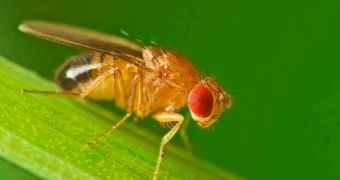First off, it need be said that, if there is one thing all people should be thankful for right about now, this thing is the fact that they are not flies. This is because, if they were, they might have found themselves making a daring appearance on “Dancing with the Stars,” and not on their own accord.
Not to beat about the bush, a new paper published in the May 25 issue of the journal Nature Methods documents the use of what is best described as a mind alteration device to make flies sing and moonwalk.
In this paper, specialists with the Research Institute of Molecular Pathology detail that this device that they used to toy with the behavior of fruit flies is known as FlyMAD, which stands for Fly Mind Altering Device.
This tool enables researches to fire either light or heat towards certain body regions of genetically engineered flies that are especially sensitive to changes in the temperature of their environment, and thus alter their behavior, information shared with the public says.
Scientist Andrew Straw and fellow researchers stress that, unlike previous studies of this kind, their work with FlyMAD made it possible to control the behavior of moving flies, and that this led to a better understanding of how to specific neuronal cell types in these insects work.
As part of their experiments, the scientists who took part in this research project exposed fruit flies to infrared light and an environmental temperature of 30 degrees Celsius (86 degrees Fahrenheit) at the same time. This altered neural pathways in the brain of these insects and triggered behavioral changes.
Specifically, the researchers made flies walk backwards by toying with neurons associated with muscle coordination, and they managed to identify neurons responsible for the act of singing and for a persistent state of courtship during which males circle their object of desire and vibrate their wings.
Commenting on why it is important to carry out such experiments, researcher Andrew Straw points out that “FlyMAD offers the fantastic opportunity to address many of our questions. We could, for example, analyze how single neurons function in a cascade within the neuronal circuit.”
The scientists wish to continue carrying out such experiments on fruit flies and say that it is possible that one day their work will help lead to a better understanding of the inner working of the mammalian brain, the human one included.
Just for the record, it need be said that Andrew Straw and colleagues collaborated with researchers at the Vienna University of Technology and a laboratory in the United States on this project.

 14 DAY TRIAL //
14 DAY TRIAL //